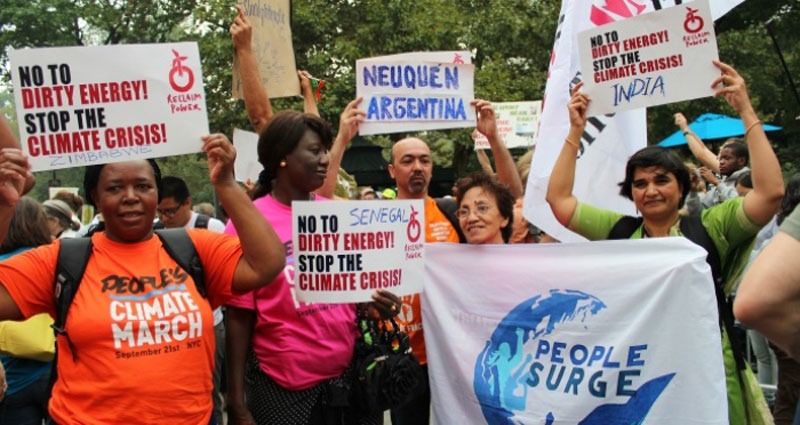
May 23, 2019; Undark
An article by Darien Alexander Williams, a doctoral student of urban planning at MIT, challenges the idea of depending upon philanthropy to address an issue as critical and pervasive as the climate crisis; in fact, he calls such dependence “folly.”
His way into the issue is through the Rockefeller Foundation’s withdrawal from its 100 Resilient Cities initiative, launched to help cities address the oncoming threats posed by climate change. Williams reminds us that the Rockefeller Foundation is endowed with money made through the production and sale of fossil fuels. As he writes, the massive project had gained traction:
More than 80 “Chief Resilience Officers” were hired and trained to work within city governments, and more than $160 million was spent to kickstart projects of all shapes and sizes. Planners designed schoolyards that remain cool during heat waves in Paris, restored urban wetlands in Atlanta, and harnessed the power of the Yaque, the Dominican Republic’s longest river, to mitigate flooding in Santiago De Los Caballeros, among other projects.
But then the foundation wandered off as of the end of the year, largely abandoning the project with little explanation. Williams writes, “For people like me, who have worked in both the research and practice of resilient city planning, it raised serious questions about the wisdom of relying on charitable organizations to fund resilience work—particularly those that were chiefly responsible for the problems to begin with.”
“And then there’s the question of who gets help,” he continues. “Can we count on private organizations to treat those marginalized communities with the same level of importance as they do the rich?”
Philanthropy does not see itself as accountable to poor communities. When real damage is done, Williams writes, society should frame the responsibility and subsequent obligations as public demands, not as requests for alms. “That means attending planning meetings, budget hearings, public forums, and town halls to remind leaders that they shouldn’t overlook the needs of communities of marginalized people—many of them people of color—in the ‘sunken places’ of low-lying, flood-prone areas across the globe. It means following and improving upon models set by places like North Carolina, where the state dedicated money and resources to help small and low-capacity towns think through issues of resilient planning in the wake of hurricane disaster.”
Sign up for our free newsletters
Subscribe to NPQ's newsletters to have our top stories delivered directly to your inbox.
By signing up, you agree to our privacy policy and terms of use, and to receive messages from NPQ and our partners.
Williams says the time of considering charitable good faith/PR gestures of private companies sufficient is long past. Instead, these companies should be taxed and regulated—in other words, “codified into formal, long-term budgetary commitments.”
We agree with this, but we should also point out that the philanthropies associated with the Rockefeller name have had varying levels of commitment to climate issues, as the New York Times discussed in this 2016 article. At that time, ExxonMobil, which was being investigated for fraud for misrepresenting the timing of its knowledge about its own climate effects, accused the Rockefeller Family Fund and the Rockefeller Brothers Fund of conspiring against the gas industry—and Exxon in particular—by funding research and journalism on the subject. The Rockefeller Brothers Fund has long been a supporter of InsideClimate News, one of the first topic-specific nonprofit news sites in the country and a winner of the Pulitzer Prize.
The then-chair of the House Science Committee, Rep. Lamar S. Smith, a Texas Republican, accused the Rockefeller funds of taking part in “a coordinated effort to deprive companies, nonprofit organizations, and scientists of their First Amendment rights and ability to fund and conduct scientific research free from intimidation and threats of prosecution.” Whereupon David Kaiser, the chair of the Rockefeller Family Fund, noted, “The Rockefeller Family Fund has exercised its freedom of speech in expressing our repugnance at ExxonMobil’s behavior.”
We have exercised our freedom of association by talking with like-minded public interest advocates about how best to educate the public about the realities of climate change. And we have exercised our right to petition the government for redress of grievances by informing elected officials about our concerns that in the course of its climate science campaign, Exxon may have violated the law. All of those rights are explicitly guaranteed to us by the First Amendment.
He said that from within the clan—the direct descendants of John D. Rockefeller and their families—he has received “passionate support” for the fund’s efforts, though he acknowledged, “I haven’t heard back from everyone.”
So, perhaps we need not eschew all climate philanthropy related to descendants of oil barons, but pick our poisons carefully for their capacity to do what they promise.—Ruth McCambridge













